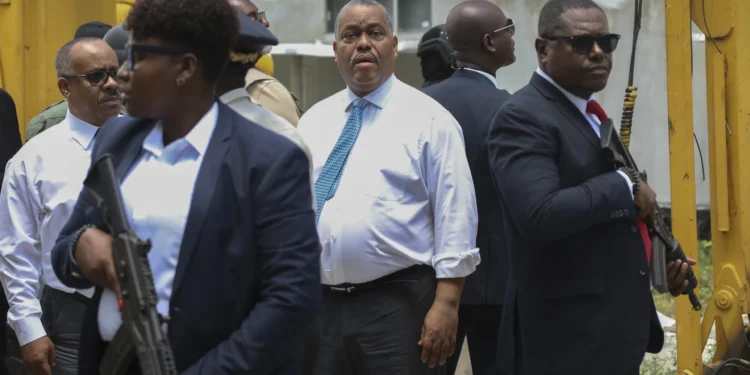The letter details a $25,000 budget the diocese had drawn up to help with ordination costs, and a request for a $10,000 donation from the USCCB so that the archdiocese “can celebrate this long-awaited event with dignity and fraternity in our suffering archdiocese.”
On July 11, Father Leo Perez, executive director of the United States Conference of Catholic Bishops Subcommittee on the Church in Latin America told Crux that the conference has answered that request, and sent the Archdiocese of Port-au-Prince $10,000 to help with the ordination costs.
Auxiliary Bishop Octavio Cisneros of Brooklyn, chair of the USCCB Subcommittee on Latin America, told Crux it was an easy decision to grant Mésidor’s request.
“To grant this donation to the Church in Haiti is a sign of our commitment to the Church and to hope,” Cisneros said. “We believe that the ordination of the bishops is a sign of hope for the people of Haiti, which is so much needed at this time.”
“The only hope that sustains us is the hope of faith, the hope that God is with us and guides our actions, our thoughts, our future, our history, and therefore to have a ceremony by the Church where the apostles, those who Christ has instituted as the pastors, as followers, as those who will guide the Church together with Peter, is very important,” Cisneros continued.
Mésidor’s letter describes some of the challenges the archdiocese faces. Mésidor said for the last two years pastoral ministry in the archdiocese has been “considerably paralyzed” by the armed gang violence. Many of the parishes in the archdiocese have no priests or Sunday services, he said, which has contributed to the archdiocese’s financial challenges.
Cisneros noted that given the challenging circumstances, holding of the ordination is a show of resilience.
“It’s the resiliency of the pastors of the Church of the people to say no to violence, to say no to the destruction of life. It’s the Church that proclaims the dignity of life. It’s the Church that proclaims the dignity of life of human beings. It’s the Church that promotes peace,” Cisneros said. “So definitely this ordination stands right in the face of all of the troubles and violence and atrocities being committed.”
MĂ©sidor said the funds will help the archdiocese with the purchase of ornaments and episcopal insignia, as well as help cover the costs of the ordination including the purchase of a hundred chasubles, the printing of booklets, and meals for those who participate in the ordination.
Pope Francis announced the auxiliary bishop appointments on May 31, and the Holy See’s Dicastery for the Service of Charity has donated the archdiocese $6,000 to help ordination costs. Mésidor said he’s hopeful that the archdiocese will receive a contribution of around $7,000 or $8,000 from religious communities and the faithful, as well.
Mésidor described Louis-Jean and Jean-Charles as “two priests devoted, straightforward pastors, gifted with a solid human, spiritual, intellectual and pastoral formation.”
A New Government, An Uncertain Future
A few days before Pope Francis appointed Louis-Jean and Jean-Charles to the Archdiocese of Port-au-Prince, Haiti’s new and internationally backed transitional government named Gary Conille as the country’s new prime minister – a role he had previously held from October 2011 to May 2012.
The transitional council is in place essentially to bring a level of stability to the plagued nation and guide it to and through the presidential elections scheduled for 2026. The challenge, however, is that the seven voting members, including Conille, aren’t exactly allies as they all represent different political parties, so there remains a level of uncertainty around the level of stability they will actually bring.
“This transitional government is a group of rivals, and they represent about seven political parties, and all of these people have been in one way or another running the Haitian government, successive governments, for the last 30 years since the departure of [Jean-Claude Duvalier],” Archbishop Thomas Wenski of Miami, who has a close relationship with Haiti and the Haitian Church, told Crux.
“So, you have a group of politicians who have basically been failures at the task of running the country, and now they’re in charge again, or they’re trying to get in charge again,” Wenski explained. “That doesn’t inspire a whole lot of hope.”
Wenski spoke with Crux this week about the situation in Haiti, following the installation of the transitional government, Conille’s appointment, and the recent arrival of 200 Kenyan police officers who are there to help back the Haitian police and army. The aforementioned all follows months of turmoil in Haiti where the government collapsed and gangs seized control.
Even with the recent developments, Wenski said that “it’s anybody’s guess what could happen.”
Wenski explained that three centers of power currently exist in Haiti: A transitional government supported by the United States, Canada, and other nations; gangs that are well armed and wreaking havoc in certain areas; and forces loyal to Guy Philippe, who led a coup against former President Jean-Bertrand Aristide in 2004 and returned to the Caribbean nation last year after serving a prison sentence in the United States.
“The other thing that’s still out there is the Haitian people, who are just sitting on the sidelines right now and watching what’s going to happen,” Wenski said. “They’re anxious that the crisis be solved. They want security because you can’t do anything in this climate of insecurity.”
As for Catholicism, Wenski said the “Church’s life goes on” as best it can. As everything unfolded, the Church was invited to be a part of the transitional government, but declined the offer essentially on the basis that it would implicate them too much in politics, and undermine their mission. Wenski said that was a wise decision, as the Church can still use its voice when deemed appropriate.
Asked if he has optimism with the direction way things are headed, Wenski deferred to hope.
“I’m not optimistic. Let’s say I’m hopeful, because hope is a theological virtue and optimism is a secular value, and there’s not a whole lot of reason for optimism in Haiti right now, but hope is always eternal,” Wenski said. “We have to have hope.”
To donate to Haiti through the USCCB-Church in Latin America program visit https://usccb.igivecatholictogether.org/.
Follow John Lavenburg on X:Â @johnlavenburg
Source link : http://www.bing.com/news/apiclick.aspx?ref=FexRss&aid=&tid=66b0f81688914e4f8cf62f0e05376393&url=https%3A%2F%2Fcruxnow.com%2Fchurch-in-the-usa%2F2024%2F07%2Fu-s-bishops-fund-ordinations-in-haiti-as-a-sign-of-hope&c=10676038661915366959&mkt=en-us
Author :
Publish date : 2024-07-12 13:00:00
Copyright for syndicated content belongs to the linked Source.












